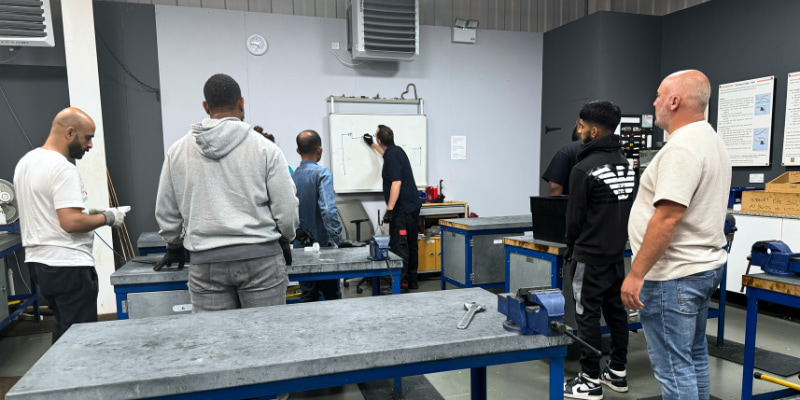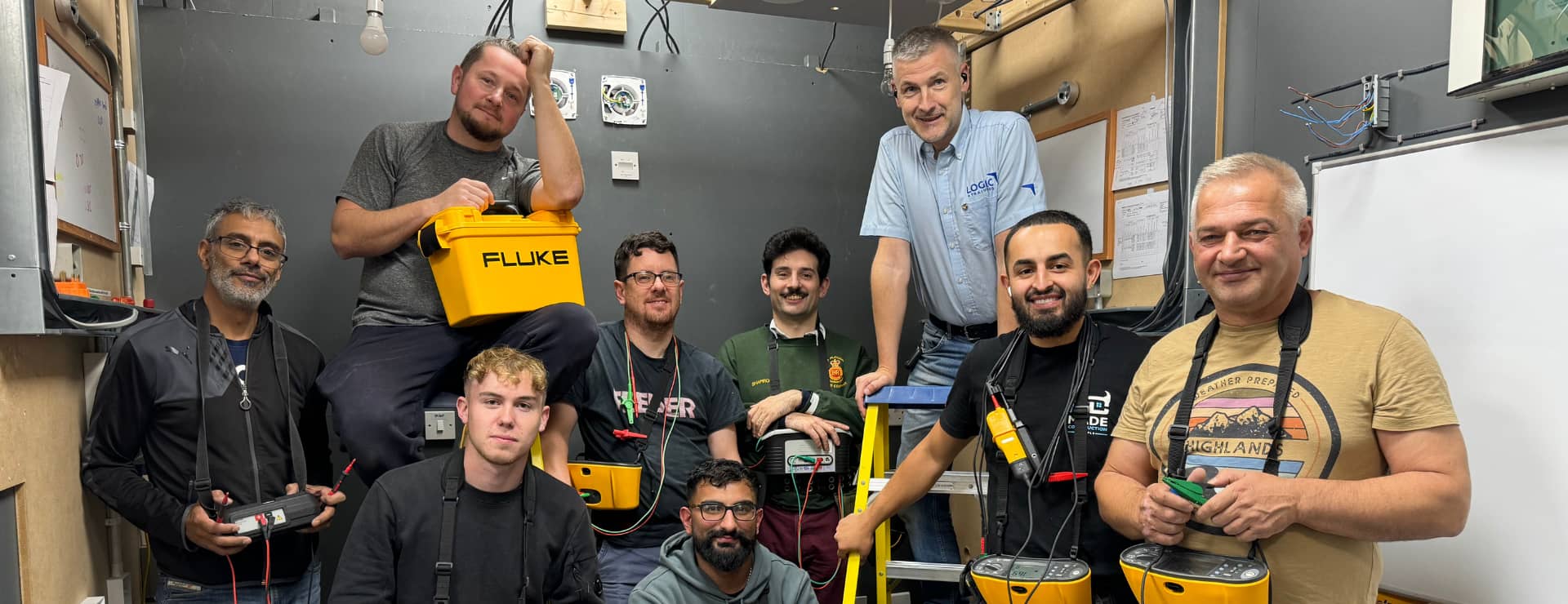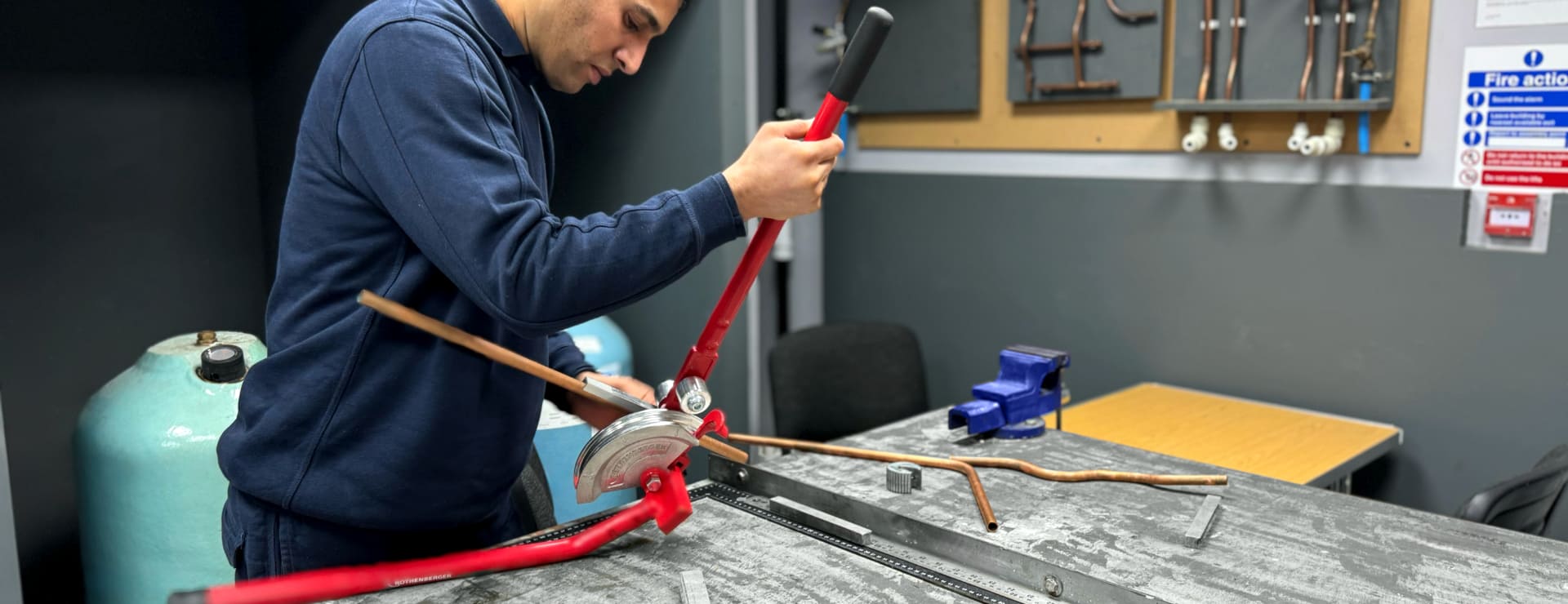
Online Learning vs In-Person Training in the Trades
Speak to our team
Can online learning replace in-person trade training? At Logic4training, we believe the answer is a definitive no. While digital platforms offer flexibility for theory, they cannot replicate the hands-on mastery required for plumbing, gas, and electrical work. For over 20 years, we’ve proven that true technical competence, which is essential for safety and UK regulatory compliance, is only achieved through supervised, physical practice with real tools in a controlled workshop. Here is why in-centre training remains the gold standard for building a successful career in the trades.

Online Learning: Understanding Its Place
The appeal of online learning is undeniable in today’s digital age. Virtual learning offers flexibility, allowing students to access materials at their convenience and learn at their own pace. This accessibility has broken down geographical barriers, making education available to those who might otherwise struggle to attend in-person sessions. Additionally, online training often comes with reduced costs, eliminating expenses related to travel, accommodation, and facility fees.
For theoretical knowledge, online training provides a platform where information can be easily updated and kept current with changing regulations and best practices. The digital format also allows for a variety of multimedia resources, including video lectures and interactive quizzes, which can enhance the learning experience for certain aspects of training.
With that being said, having delivered all of our theory training in-person (as well as the practical training), we can confidently say that students physically being in a classroom is a must! During this time, the class as a whole develops a sense of soft skills. Students will build connections with their peers whilst they’re in a learning environment that promotes a culture of professionalism that’s specific to the trade. Not only this, but learning in-person provides a multi-sensory training experience that leads to better focus and retention.
While online learning offers undeniable advantages for delivering theoretical knowledge, it’s important to recognise the potential risks associated with online learning, especially when it comes to hands-on professions like those previously mentioned.
The Risks of Online Learning
When it comes to training within the trades, such as plumbing, gas, electrics, and other hands-on sectors, online courses reveal significant limitations. The trades are fundamentally a hands-on profession where theoretical knowledge must be complemented by practical application.
Watching a video or an online lecture about how to wire a circuit or install a boiler is vastly different from actually performing these tasks, even under the watchful eye of an experienced instructor. This gap between theory and practice can lead to dangerous situations when inadequately trained individuals attempt complex installations or repairs.
Online learning in the form of an online plumbing course, online gas course or online electrician course often falls short in providing the experience necessary for developing crucial skills and poses several significant risks.
Being Misguided or Mis-Sold
A common issue with online trade training is the risk of being misguided or mis-sold a course. Some providers use aggressive marketing tactics or make exaggerated claims about job prospects, qualifications, or the quality of their programs. People may be led to believe that enrolling in an in-depth, comprehensive online or even “blended” course will provide them with vast amounts of content and the necessary training, only to discover later that these promises were misleading. This can, and often, leads to frustration, wasted time and even financial loss, when the individual realises they need to seek additional training elsewhere.
Poor Content Quality
One of the most significant risks of online learning in the trades is poor-quality content. Many courses that incorporate online learning rely on outdated or generic materials that fail to address the complexities of modern trade work. For example, plumbing, gas, and electrical work all require up-to-date knowledge of regulations, tools, and techniques, yet some courses provide only basic, or even irrelevant, information, in poorly structured online lectures or videos. Without high-quality, thorough, in-person training, students will struggle to develop the technical expertise needed to perform tasks effectively and safely. This not only wastes time and money but also leaves learners unprepared for real-world challenges.
Skill Deficiencies & Safety Concerns
Trades like plumbing, gas, and electrical work demand a high level of practical skill that cannot be fully developed through online learning. While theory is important, it must be complemented by hands-on experience under the guidance of experienced professionals. Online learning often fails to bridge this gap effectively, leaving students with significant skill deficiencies. Taking something you learnt online, 2 months prior to getting into a workshop, and trying to apply it will only end one way. Skills, procedures and their underpinning reasoning need to be learnt as one. These gaps can hinder their ability to perform tasks competently on-site and may require additional time and resources to address through further training.
Safety is another critical aspect of any trade, and inadequate training can pose serious risks to both workers and clients. Online learning often lacks the practical, hands-on experience required to teach proper safety procedures for working with tools, equipment, and hazardous environments. Without supervised practice, students may not fully understand how to identify risks, follow safety regulations, or respond to emergencies. This not only endangers their own well-being but also compromises the safety of future projects they undertake.
Instant Course Access
Whilst having instant access to a course sounds like a good thing, this is what catches most people out and can result in difficulties when trying to get a refund. When enrolling in online training courses, individuals typically have a 14-day cooling-off period during which they can cancel and receive a refund. However, accessing online content or starting the course often constitutes “commencement of services,” which can limit refund eligibility. After this period, refunds are generally restricted unless the provider fails to deliver services as agreed, such as excessive delays or significant changes to the course structure. Some training providers also disclaim liability for career outcomes or qualification guarantees, leaving students with limited recourse if the course does not meet expectations. To avoid issues, it’s essential that buyers carefully review terms and conditions, avoid starting the course until they are confident, and act promptly if dissatisfied within the cancellation window.
In-Person Training: The Gold Standard
The Unmatched Benefits of In-Person Training
In-person training stands out as the superior method for learning within the trades due to its irreplaceable hands-on component. This is probably the most obvious reason as when learning occurs in a physical training environment, students can touch, feel, and manipulate the actual tools and materials they’ll be using in their careers. This tangible experience is crucial for developing muscle memory and the intuitive understanding that comes only from repeated practical application.

Hands-on training also stimulates active participation in a way that online learning simply cannot. Problem-solving exercises, role-playing scenarios, and team games become more enriching when performed face-to-face. The physical nature of in-person training allows trainees to be directly involved with demonstrations and carry out practical tasks alongside their peers, keeping them engaged and alert throughout the learning process.
Another significant advantage is the immediate feedback loop. Instructors can observe students in real-time, identify issues with technique or understanding, and provide instant correction. This immediate intervention prevents the formation of bad habits and ensures that learners develop proper skills from the outset. The value of having an experienced professional guide you through a complex procedure cannot be overstated in trades where precision is paramount.
Beyond the technical and practical advantages, in-person training offers additional benefits that extend into how students absorb information and interact with others. These factors play a crucial role in shaping not just competent tradespeople, but well-rounded professionals.
Enhanced Focus and Retention
The structured environment of in-person training helps students maintain focus on the material. Without the distractions inherent in home learning environments, trainees are forced to be more present and engaged. This enhanced focus typically leads to better knowledge retention and skill development.
Furthermore, the multi-sensory experience of in-person training, such as seeing demonstrations, hearing explanations, and physically performing tasks, engages different learning pathways, reinforcing understanding and improving long-term retention of skills and knowledge.
Building Professional Relationships and Culture
In-person training also excels in fostering teamwork and professional relationships. The trades industry relies heavily on collaboration and communication, skills that are best developed through face-to-face interaction. Training sessions provide valuable opportunities for students to network with peers and instructors, creating connections that can benefit their careers long after the training concludes.
Additionally, in-person learning environments promote a culture of professionalism specific to the trades. Students absorb not just the technical skills but also the attitudes, values, and work ethic that define successful tradespeople. This cultural immersion is difficult to replicate in an online setting where students are isolated from the community they aim to join.
Why In-Person Training is a Must
When it comes to plumbing, electrical, and gas work, in-person training isn’t just the gold standard. It’s a legal and industry-mandated necessity. While some training providers offer an online plumbing course, online gas course, or online electrical course, the nature of these trades demands hands-on competence, safety awareness, and the ability to demonstrate skills in real-world settings. Here’s why online training simply cannot meet the regulatory requirements or deliver the expertise needed for these essential professions.
Plumbing
To become a qualified plumber in the UK, candidates must complete an industry-recognised qualification such as Diplomas and NVQs in Plumbing and Heating.
- Practical Assessments: These qualifications require candidates to undertake a series of in-person assessments and on-site portfolio tasks, such as installing and maintaining real plumbing systems, fault finding, and adhering to water regulations.
- Portfolio Evidence: For the NVQs, learners must provide evidence of their competence through witnessed installations and maintenance tasks carried out in real settings-not simulations or online exercises, which are common in many online plumbing courses
- Regulatory Compliance: Additional certifications, such as WRAS (Water Regulations Advisory Scheme) or Hot Water Systems and Safety (Unvented Hot Water Systems), require in-person training and assessment, as only hands-on demonstration can prove safe working practices and regulatory understanding.
Gas
Gas work in the UK is highly regulated due to the risks involved.
- Legal Requirement: It is illegal to work on gas appliances or installations unless you are Gas Safe Registered. This is a process that mandates in-person, supervised portfolio building and the successful completion of the ACS (Accredited Certification Scheme) assessment.
- Live Installations: Training programmes, such as the Managed Learning Programmes (MLP), require candidates to complete a portfolio of live gas installations under the supervision of a qualified engineer. This hands-on experience is essential for demonstrating competence and safety.
- Critical Safety Skills: Skills like tightness testing, combustion analysis, and safe isolation simply cannot be learned or assessed online. Only in-person training ensures that learners can safely and correctly perform these tasks in real homes and businesses.
Electrics
The electrical industry is governed by strict standards to ensure public safety.
- NVQ Level 3 Requirement: To work unsupervised or join a Competent Person Scheme (CPS), electricians must achieve an NVQ Level 3, which involves a significant portfolio of on-site evidence and in-centre practical assessments.
- AM2 Assessment: The final AM2 (Achievement Measurement 2) is a rigorous, hands-on practical test that simulates real-world electrical installations and fault-finding scenarios. There is no online substitute for this assessment.
- Building Regulations Compliance: Electrical work in dwellings is subject to Part P of the Building Regulations, which requires proof of competence through practical demonstration.
The Bottom Line
If you want to become a qualified plumber, gas engineer, or electrician in the UK, in-person training and assessment are not just recommended, but they are required by law and by industry bodies. This ensures that every professional entering these trades has demonstrated their ability to work safely, competently, and in line with current regulations, protecting both themselves and the public.
There is no substitute for supervised practice. Watching a video or completing an online quiz can’t replicate the complexity, unpredictability, and safety-critical nature of real installations. All UK qualifications in the trades should be carried out in-person with evidence of skills being developed that transfer into the working world. This is something that online plumbing, online gas, and online electrical courses cannot provide.
The Critical Question: Who Would You Trust?
Let’s consider a scenario that puts this debate into perspective: Imagine your home’s boiler has failed in the middle of winter, or an electrical fault is causing concern for your family’s safety. Who would you prefer to call?

Would you trust someone who has primarily learned their trade from an online gas course, or, respectively, an online electrician course where a large percentage of their training was watching videos and taking quizzes? Or would you feel more confident with a professional who has spent all of their time in a training centre, working hands-on with actual equipment under the guidance of experienced instructors?
The answer is clear for most homeowners. When our safety, comfort, and property are at stake, we want someone with comprehensive practical experience. Someone who has learned by doing, not just by watching or reading.
Conclusion
While technology continues to transform education across many fields, the skilled trades remain firmly anchored in hands-on learning and practical experience.
At Logic4training, we believe that comprehensive in-person training is the best form of training. This can be supported by high-quality online revision resources like ClubLogic, but the training itself has to be in-person.
Online Revision Tools: The Best of Both Worlds
We recognise that digital tools can play a valuable supplementary role. Logic4training’s ClubLogic platform exemplifies this balanced approach. ClubLogic serves as an online revision tool that complements the in-person training experience, rather than replacing it.
This platform allows students to reinforce what they’ve learned in person, providing mock tests, videos and useful content that helps candidates to revisit anything that they have learned on their course. It’s designed to support the revision process after students have already participated in comprehensive hands-on training, ensuring they’re well-prepared for assessments.
The success of this blended approach is evident in the feedback: 9 out of 10 ClubLogic users report that it helped them prepare for their course, and 94% of candidates on related courses use the platform.
One of our previous gas students, Paul, said:
“Very helpful and useful tool. Makes the learning process easier to manage”
Paul is one of many who have praised the online revision platform and goes to demonstrate that online tools can be highly effective when used to enhance, rather than replace, in-person training.
Our Final Thoughts
The tangible benefits of hands-on, in-person training are enhanced knowledge retention, real-world application, improved problem-solving, and the development of professional relationships. These cannot be replicated in a purely online environment. When it comes to the trades that maintain our homes, ensure our safety, and support our modern way of life, there is no substitute for the confidence and competence that comes from proper hands-on training.
After all, would you prefer your boiler to be serviced by someone who has primarily watched videos about the process, or by someone who has repeatedly performed the procedure under expert supervision in a training environment? For most of us, the answer is clear, and it’s why Logic4training remains committed to providing the highest quality in-person training for the trades professionals of today and tomorrow.
FAQ's
Trades require precision and practical skills that can only be developed through direct interaction with tools and materials. Hands-on training ensures learners gain confidence in performing tasks safely and efficiently, reducing the risk of errors that could lead to safety hazards or system failures in real-world scenarios.
Blended learning combines in-person training with online learning. At Logic4training, our blended learning consists of in-person training for the duration of your course, and you will have access to ClubLogic, our online revision platform. ClubLogic allows our students to revise theory elements that they have already covered at home. This approach maximises knowledge retention while ensuring hands-on expertise.
When you see a training provider offer blended learning, always check to see what their blended learning consists of.
Most training providers are open to how much online learning they offer but if they aren’t, be cautious. This should be a big red flag.
Yes, online learning is often more affordable due to reduced costs for travel, accommodation, and facilities. However, training in the trades, the investment in in-person training pays off by producing highly skilled professionals who meet industry standards.
Absolutely! Online platforms like ClubLogic are excellent for supplementing practical learning. They provide revision materials such as mock tests and videos that reinforce concepts taught during hands-on sessions.
Yes. Employers value candidates with extensive practical experience gained through in-person training as it demonstrates readiness to handle real-world challenges effectively. This is especially critical in high-stakes fields like gas safety or electrical work.
Consider your goals:
- If you need flexibility and are looking to gain theoretical knowledge, online courses might suit you, but be cautious. Research the training provider to make sure their online content is good and that you still gain adequate hands-on training.
- If you want comprehensive skills that include both theory and practice, opt for an in-person course like we offer at Logic4training.
Yes, you have several important rights and protections when purchasing online courses in the UK:
14-Day Cooling-Off Period: Under the Consumer Contracts Regulations, if you buy a course online for personal use (not as part of your business or trade), you have the right to cancel within 14 days of purchase and receive a full refund-unless you have requested the course to start within that period, in which case you may need to pay for any part of the course already delivered.
Quality and Accuracy: The Consumer Rights Act 2015 protects you by requiring that online courses must be as described, of satisfactory quality, and delivered with reasonable care and skill. If the course content is misleading, not as promised, or of poor quality, you can request a remedy such as a repeat performance or a price reduction, and in some cases, a full refund.
Digital Content Rights: If you purchase a downloadable or streamed course, you are entitled to digital content that is fit for purpose and free from defects. If you can’t access the course or it doesn’t work as described, you can seek a refund or replacement.
Mis-selling and Unfair Practices: If you were misled or pressured into buying a course, you may be protected under the Consumer Protection from Unfair Trading Regulations and could be entitled to a refund.
If you’re thinking of purchasing an online training course, carefully review the provider’s terms and conditions, as they will outline important details.
If you feel your rights have been breached, try to resolve the issue directly with the provider first. If that fails, you can escalate your complaint using consumer protection laws.
From no experience to ready to work with a professional
